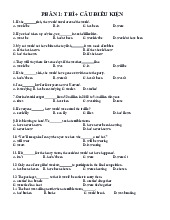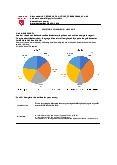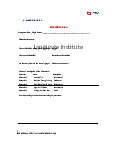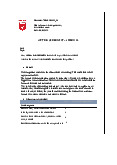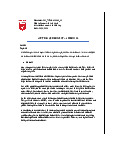







Preview text:
4. The film is not only boring but also long.
5. She neither wrote nor phoned.
6. Both his parents and his brother are going to Halong Bay next Sunday.
7. Helen lost not only her passport but also her wallet at the airport.
8. I haven't got either time or money to go on holiday.
I have got neither time nor money to go on holiday.
9. On Friday evening, sometimes I either go to the cinema or stay at home and watch TV.
10. Both she and I were really frightened when hearing the noise from the forest.
She together with I was really frightened when hearing the noise from the forest. 11. I like both Tom and Peter.
12. The watch is not only the cheapest but also the nicest.
13. I like neither horror film nor action film.
14. Neither he nor his wife comes on time.
15. I don't like either watching TV or reading a novel before going to bed.
16. They can begin working neither on Monday nor on Wednesday.
They can't begin working either on Monday or on Wednesday.
17. My sister didn't either watch TV or listen to music last night.
18. We go to school not only in the morning but in the afternoon as well.
5. Cách sử dụng của các liên từ khác STT LIÊN TỪ CÁCH DÙNG VÍ DỤ 1 AND
Thêm, bổ sung thông tin She is rich and famous. (và)
(Cô ấy giàu có và nổi tiếng.) 2 NOR
Bổ sung thêm một ý phủ I don't want to call him nor intend to
định vào một ý phủ định apologize to him. được nêu trước đó.
(Tôi không muốn gọi cho anh ấy cũng (cũng không)
không có ý định xin lỗi anh ta.) 3 BUT
Diễn tả sự đối lập, ngược She is beautiful but arrogant. nghĩa
(Cô ấy xinh đẹp nhưng kiêu ngạo.) (nhưng, nhưng mà) 4 OR Nêu thêm sự lựa chọn
Hurry up or else you will miss the last bus. = OR ELSE (hoặc là, hay là)
(Nhanh lên hoặc là bạn sẽ nhỡ chuyến xe = OTHERWISE buýt cuối cùng.) 5 YET
Đưa ra một ý ngược lại so They are ugly and expensive, yet people với ý trước đó buy them. (vậy mà, thế mà)
(Chúng xấu và đắt, vậy mà mọi người vẫn mua.) 6 SO
Nêu kết quả của hành động + He was ill, so he didn't go to school (THEREFORE = (vì vậy, do đó, do vậy) yesterday. THUS
(Anh ấy bị ốm nên hôm qua anh ấy không = HENCE tới trường.) =CONSEQUENTLY
+ The car in the front stopped so suddenly. = AS A RESULT)
Therefore, the accident happened.
(Chiếc ô tô đằng trước dừng quá đột ngột,
vì vậy vụ tai nạn đã xảy ra.) 7 RATHER THAN Diễn tả lựa chọn
I think you should choose to become a (hơn là) teacher rather than a doctor.
(Tôi nghĩ bạn nên chọn trở thành giáo viên hơn là bác sĩ.) 8 WHETHER... OR Diễn tả sự thay thế
I don't know whether he will come or not. (hay là)
(Tôi không biết là anh ấy sẽ đến hay không.) 9 AS ... AS
So sánh ngang/không ngang + She is as tall as me. SO ... AS
bằng (bằng/không... bằng) (Cô ấy cao bằng tôi) + She isn't as/so tall as me.
(Cô ấy không cao bằng tôi.) 10
BARELY ... WHEN Diễn tả quan hệ thời gian Hardly had he gone to bed when the
HARDLY ... WHEN (ngay khi ... thì, vừa mới ... telephone rang. SCARCELY... thì)
(Ngay khi anh ấy đi ngủ thì điện thoại WHEN kêu.) NO SOONER ...THAN 11 AFTER
Diễn tả hành động xảy ra After he had finished his work, he went
sau một hành động khác out for a drink. (sau khi)
(Ngay khi anh ấy xong việc, anh ấy ra ngoài uống nước.) 12 BEFORE
Diễn tả hành động xảy ra He had finished his work before he went
trước một hành động khác out for a drink. (trước khi)
(Anh ấy đã xong việc trước khi anh ấy ra ngoài uống nước.) 13 AS SOON AS
Chỉ một hành động xảy ra As soon as she went home, she had a bath.
liền ngay sau một hành (Ngay khi cò ấy về nhà, cô ấy đi tắm.) động khác (ngay khi) 14 JUST AS
Diễn tả hai hành động xảy He left the meeting just as we arrived.
ra gần như cùng thời điểm (Anh ta rời khỏi cuộc họp vừa lúc chúng (ngay khi, vừa lúc) tôi tới đó.) 15 ONCE
Nói về một thời điểm mà ở Once you have well-prepared for it, you
đó một hành động đã xảy ra will certainly be successful.
hoặc sẽ xảy ra (một khi)
(Khi bạn đã chuẩn bị kĩ càng cho nó, thì
bạn chắc chắn sẽ thành công.) 16 UNTIL/TILL
Chỉ hành động xảy ra/ I wil I will wait for you until it’s possible.
không xảy ra cho tới một (Anh sẽ đợi em đến chừng nào có thể.)
thời điểm nào đó (cho tới khi.) 17 IN OTHER
Để giải thích rõ nghĩa hơn He was economical with the truth - in WORDS (nói cách khác) other words, he lied.
(Anh ấy tiết kiệm sự thật hay nói cách
khác là anh ấy nói dối.) 18 WHEN
Liên kết hai hành động có When she came, I was cooking dinner.
mối quan hệ về thời gian (Khi cô ấy tới, tôi đang nấu bữa tối.) (khi) 19 WHILE
Chỉ các hành động diễn ra While I was doing my homework, my = MEANWHILE cùng một lúc (trong khi) mother was cleaning the floor.
(Khi tôi đang làm bài tập về nhà thì mẹ tôi đang lau nhà.) 20 SO THAT
Nêu mục đích hoặc kết quả I’m trying my best to study English well
= IN ORDER THAT của hành động có dự tính so that I can find a better job. (để mà)
(Tôi đang cố gắng hết sức học tiếng Anh
để tôi có thể tìm được một công việc tốt hơn.) 21
FOR FEAR THAT Chỉ mục đích phủ định (vì e He wore dark glasses lest he could be = LEST rằng, sợ rằng) recognized.
(Anh ta đeo kính râm vì sợ rằng mình có thể bị nhận ra.) 22 WHEREAS
Diễn tả sự ngược nghĩa giữa He loves foreign holidays whereas his = ON THE hai mệnh đề (trong khi) wife prefers to stay at home. CONTRARY
(Anh ấy thích đi du lịch nước ngoài trái lại = IN CONTRAST
vợ anh ấy thì chỉ thích ở nhà.) = ON THE OTHER 23 AS/SO LONG AS
Diễn tả điều kiện (với điều You can use my bike providing that you = PROVIDING kiện là, miễn là)
promise to give it back tomorrow. (THAT)
(Bạn có thể sử dụng xe đạp của tôi với = PROVIDED
điều kiện bạn hứa trả lại nó vào ngày (THAT) mai.) 24 IN THE EVENT
Diễn tả giả định về một Take an umbrella in case it rains. THAT
hành động có thể xảy ra (Mang theo ô phòng khi trời mưa.) = IN CASE trong tương lai (trong trường hợp, phòng khi) 25 SUPPOSE
Dùng để thay thế cho "if" Supposing he hates you, what will you do? SUPPOSING
trong mệnh đề phụ [giả sử
(Giả sử anh ấy ghét bạn, bạn sẽ làm gì?) (THAT) 26 AS IF/THOUGH
Dùng trong giả định (như He looked frightened as if he had seen a thể là) ghost.
(Anh ấy trông hoảng sợ như thể anh ấy đã nhìn thấy ma.) 27 BESIDES
Dùng để bổ sung thêm ý/ I can't go now, I'm too busy. Besides, my MOREOVER thông tin passport is out of date. FURTHERMORE
(Ngoài ra/hơn nữa/thêm vào (Tôi không thể đi bây giờ; tôi bận lắm. IN ADDITION đó)
Ngoài ra, hộ chiếu của tôi đã hết hạn rồi.) 28 FOR EXAMPLE Ví dụ, chẳng hạn như
There are many interesting places to visit = FOR INSTANCE
in the city. The art museum, for instance,
has an excellent collection of modern paintings.
(Có nhiều nơi thú vị để đến thăm trong
thành phố này. Chẳng hạn như viện bảo
tàng nghệ thuật có một bộ sưu tập xuất sắc
các bức tranh hiện đại.) 29 INDEED Được dùng để
nhấn I am happy, indeed proud, to be a member = IN FACT
mạnh/xác nhận thông tin of your team. trước đó
(Tôi rất vui, thực sự là rất tự hào được là (thực sự, quả thật)
một thành viên trong đội của bạn.) 30 INSTEAD Thay vì, thay vào
We didn't go on holiday. We stayed at home, instead.
(Chúng tôi đã không đi du lịch. Thay vào đó, chúng tôi ở nhà.) B. BÀI TẬP ÁP DỤNG
Exercise 1: Chọn phương án đúng
1. _________ of the committee, I'd like to thank you for your generous donation. A. Instead B. On behalf C. According D. In spite
2. _________, I decided to stop trading with them.
A. Despite of the fact that they were the biggest dealer
B. Though being the biggest dealer C. Being the biggest dealer
D. Even though they were the biggest dealer
3. I think it's _________ to take a few more pictures. A. enough light B. lightly enough C. light enough D. enough as light
4. _________ I heard the phone ring, I didn't answer it. A. because B. Only if C. Even though D. Provided that
5. Determining the mineral content of soil samples is an exacting process; _________, experts must
perform detail tests to analyze soil specimens. A. therefore B. afterward C. so that D. however
6. Businesses will not survive _________ they satisfy their customers. A. or else B. in case C. unless D. if
7. This investigation is not only one that is continuing and worldwide _________ we expect to continue for quite some time. A. but one also that B. but one that also C. but also one that D. but that also one
8. A few natural elements exist in _________ that they are rarely seen in their natural environments. A. such small quantities B. so small quantities C. very small quantities D. small quantity
9. He decided to quit the job _________ the high salary he got. A. although B. in spite C. despite D. much as
10. I will stand here and wait for you _________ you come back. A. because B. though C. so D. until
11. My sister won't go to the party tonight and _________. A. so will I B. I will too C. neither will I D. I will neither
12. When he came to the counter of pay he found that he had _________ cash _________ his credit card with him. A. either/or B. neither/nor C. both/and D. not/neither
13. _________ we understand his reasons, we cannot accept his behaviour. A. As if B. What if C. Even if D. Only if
14. _________ his poor English, he managed to communicate his problem very clearly. A. Because B. Even though C. Because of D. In spite of
15. Neither the students nor their lecturer _________ English in the classroom. A. have used B. use C. are using D. uses
16. _________ the price is high, we can't afford to buy a new car. A. Now that B. Although C. Whereas D. As long as
17. He hurried _________ he wouldn't be late for class. A. since B. as if C. unless D. so that
18. I'm sorry you've decided not to go with us on the river trip, but _________ you change your mind,
there will still be enough room on the boat for you. A. even B. nevertheless C. in the event that D. provided that
19. _________ you read the instructions carefully, you will understand what to do. A. as well as B. as far as C. as soon as D. provided that
20. My father is getting old and forgetful _________ he is experienced and helpful.
A. Be that as it may B. Regardless C. Lest D. Consequently
21. We've had _________ problems with our new computer that we had to send it back to the shop. A. so B. such C. enough D. too
22. The baby can't even sit up yet, _________ stand and walk! A. but for B. let alone C. all but D. rather than
23. All the candidates for the scholarship will be equally treated _________ of their sex, age, or nationality. A. regardless B. regard C. regarding D. regards
24. Don't be late for the interview, _________ people will think you are a disorganized person. A. Unless B. lest C. so D. otherwise
25. You should take regular exercise _________ sitting in front of the television all day. A. in spite of B. instead of C. without D. even
26. High-level sport people must maintain a high level of fitness _________ run the risk of suffering
injuries that cause permanent damage. A. or else B. besides C. unless D. on account of
27. _________ irritating they are, you shouldn't lose temper with small children. A. No matter how much B. As much as C. However D. Although
28. There are _________ that not only governments but also individuals should join hand to tackle.
A. too numerous environmental problems
B. such a lot of environmental problems
C. so fewer environmental problems
D. such many environmental problem
29. The second-hand car Patrick bought was almost new _________ it was made in the 1990s. A. or B. because C. although D. however
30. "Did the minister approve the building plans?"
"Not really. He turned them down _________ that the costs were too high." A. in case B. supposing C. provided D. on the grounds
Exercise 2: Chọn phương án thích hợp với câu ban đầu
1. I didn't want to disturb the meeting. I left without saying goodbye.
A. Rather than disturb the meeting, I left without saying goodbye.
B. I disturbed the meeting because I said goodbye.
C. I would rather disturb the meeting than leaving without saying goodbye.
D. The meeting was disturbed as I left saying goodbye.
2. Having spent all his money, Daniel couldn't afford a new watch.
A. As Daniel had bought a new watch, he spent all his money.
B. Daniel didn't buy a new watch although he had a lot of money.
C. Because he had spent all the money, Daniel couldn't afford a new watch.
D. Daniel couldn't get a new watch because he didn't have much money.
3. She doesn't want to go to their party. We don't want to go either.
A. Either we or she wants to go to their party.
B. Neither we nor she want to go to their party.
C. Neither we nor she wants to go to their party.
D. Neither she nor we don't want to go to their party.
4. Noisy as the hotel was, they stayed there.
A. Much as the hotel was noisy, they stayed there.
B. In spite of the noisy hotel and they liked it.
C. Despite the hotel was noisy, they stayed there.
D. Although the noisy hotel, they stayed there.
5. She was so busy that she couldn't answer the phone.
A. She was very busy that she couldn't answer the phone.
B. She was too busy to answer the phone.
C. She was too busy not to answer the phone.
D. She was very busy so that she couldn't answer the phone.
6. Tim graduated with a good degree. He joined the ranks of the unemployed.
A. Tim joined the ranks of the unemployed because he graduated with a good degree.
B. If Tim graduated with a good degree, he would join the ranks of the unemployed.
C. Though Tim graduated with a good degree, he joined the ranks of the unemployed.
D. That Tim graduated with a good degree helped him join the ranks of the unemployed.
7. In spite of his poverty, he led a devoted life to the revolutionary cause.
A. He could not devote his life to the revolutionary cause because of his poverty.
B. Although he was poor, he led a devoted life to the revolutionary cause.
C. If he had not been so poor, he could have devoted his life to the revolutionary cause.
D. He led a devoted life to the revolutionary cause, but he was so poor.
8. She tried very hard to pass the driving test. She could hardly pass it.
A. Although she didn't try hard to pass the driving test, she could pass it.
B. She tried very hard, so she passed the driving test satisfactorily.
C. No matter how hard she tried, she could hardly pass the driving test.
D. Despite being able to pass the driving test, she didn't pass it.
9. Smallpox is a dangerous disease. Malaria is a dangerous disease.
A. Smallpox is a dangerous disease, and so is malaria.
B. Malaria is a dangerous disease, but smallpox is not.
C. Neither smallpox nor malaria is a dangerous disease.
D. Either smallpox or malaria is a dangerous disease.
10. Transportation has been made much easier thanks to the invention of car. However, cars are the
greatest contributor of air pollution.
A. The invention of cars has made transportation much easier, but cars are among the greatest contributors of air pollution.
B. However easier the invention of cars has made transportation, it is cars that among the greatest contributors of air pollution.
C. Although the invention of cars has made transportation much easier, cars are the greatest
contributor of air pollution of air.
D. Although the invention of cars has made transportation much easier, people use cars to contribute to the pollution of air.
11. I thought she was the right person for the position, yet it turned put that she was quite useless.
A. Because I was expecting her to be competent, I was shocked to see her perform rather badly.
B. I was mistaken about her suitability for the position since she proved rather incompetent.
C. Contrary to my initial impression, she was not totally unsuitable for the position.
D. I was right in thinking that she was totally useless for the job.
12. The substance is very toxic. Protective clothing must be worn at all times.
A. Since the substance is very toxic, so protective clothing must be worn at all times.
B. So toxic is the substance that protective clothing must be worn at all times.
C. The substance is such toxic that protective clothing must be worn at all times.
D. The substance is too toxic to wear protective clothing at all times.
13. The film was not interesting. However, he tried to watch the whole film.
A. In spite of the film uninteresting, he tried to watch the whole film.
B. Uninteresting as the film was, he tried to watch the whole film.
C. Despite of uninteresting film, he tried to watch the whole film.
D. Uninteresting as was the film, he tried to watch the whole film.
14. Although she was very old, she looked very grateful.
A. In spite of very old, she looked very grateful.
B. Despite she was very old, she looked very grateful.
C. Despite her old age, she looked very grateful.
D. In spite her being old, she looked very grateful.
15. She gets up early to prepare breakfast so that her children can come to school on time.
A. Despite her getting up early to prepare breakfast, her children cannot come to school on time.
B. Because she wanted her children to come to school on time, she gets up early to prepare breakfast.
C. If she does not get up early to prepare breakfast, her children will not come to school on time.
D. Unless she gets up early to prepare breakfast, her children will not come to school on.
16. I whispered as I didn't want anybody to hear our conversation.
A. So as not to hear our conversation I whispered.
B. Since nobody wanted to hear our conversation I whispered.
C. Because I whispered, nobody heard our conversation.
